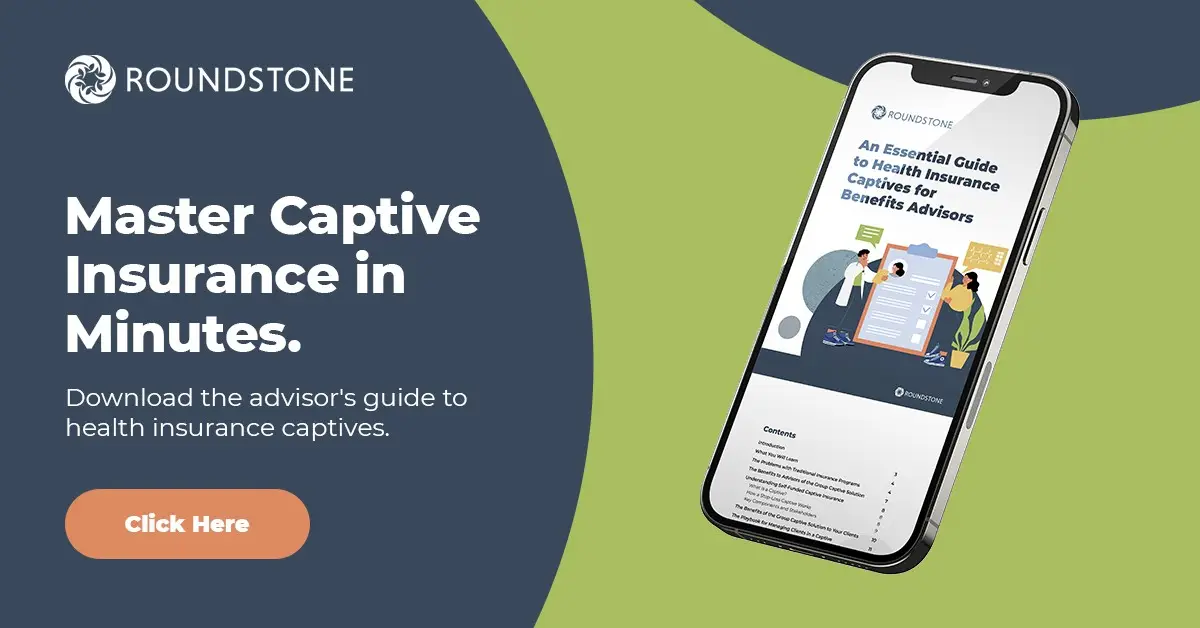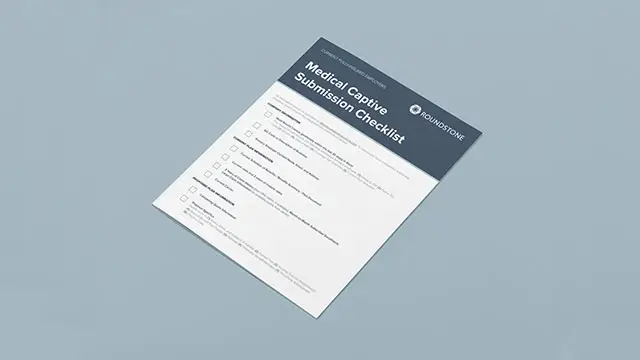Highlights
- Group captive insurance is a type of self-insurance. Participants share risk with other members.
- A group captive can make self-funded insurance more accessible to a small or midsize companies.
- Both options can provide greater control over healthcare costs.
Imagine having the power to take control of your healthcare spending, design a plan that fits your company’s unique needs. You can even get a refund at the end of the year — all without sacrificing the quality of your employee benefits. It may sound too good to be true, but with the right approach to self-funding, you can make it happen.
Roundstone offers group captive insurance, which is a type of self-insurance. The offering is a cost-saving alternative to traditional fully funded insurance.
Captive Insurance vs. Self-Insurance: What’s the Difference?
While in 2023, 83% of self-funded covered workers were from large companies, only 18% were from small to midsize businesses. The reason for that difference is simple. Until recently, only large corporations had the resources to self-fund employee health insurance. But that’s changing.
With insurance rates rising, self-funding for smaller groups through a group captive has become a more viable option. Between 2021 and 2023, 2.9 million members left their fully insured plans for more innovative options.
When exploring options beyond fully insured employee health plans, two primary self-funding models emerge: self-insurance and group captive insurance.
The chart below shows the factors that set them apart.
| Feature | Self-Insurance | Self-Funding with Captive Insurance |
| Funding Approach | Employers fund healthcare costs directly through a dedicated bank account. | Combines self-funding with shared risk by pooling resources with other businesses. |
| Ideal For | Large companies with substantial financial reserves and ability to absorb high-cost risks. | Small and midsize companies seeking cost predictability and stability. |
| Risk Management | Employers typically purchase stop-loss insurance to protect against catastrophic claims. | Includes distributed stop-loss coverage to minimize volatility and financial exposure across all member companies. |
| Cost Predictability and Stability | Costs can vary significantly based on claims incurred, leading to potential financial volatility. | Shared risk and stop-loss coverage provide more predictable and stable costs for businesses of varying sizes. |
What is Self-Insurance?
Self-insurance requires businesses to independently fund healthcare costs, making it most suitable for large companies with high risk tolerance and financial reserves.
What is Self-Funding With Captive Insurance?
Self-funding with captive insurance pools resources among businesses to share risk, providing cost stability, transparency, and stop-loss protection for small to midsize companies.
With a captive self-funded model, small to midsize companies can now self-insure with the confidence of Fortune 500s.
The Advantages of Captive Insurance for Small Businesses
Why do more small and midsize businesses prefer group captives over pure self-insurance?
Captive insurance delivers:
- Risk sharing. Share risks with like-sized companies, reducing the financial impact of large claims.
- Cost savings. Access economies of scale, resulting in lower overall costs.
- Flexibility and control. Design healthcare plans tailored to specific needs, including wellness incentives and preferred provider networks.
- Transparency. Direct access to claims data enables informed decision-making and healthcare cost-containment strategies.
- Return on unused premiums. Members receive refunds of unused funds in the captive pool in the form of annual distributions, unlike traditional fully insured plans.

Advisors: Master captive insurance in minutes. Download our free eBook.
Ready to Take Control of Your Healthcare Expenses?
Roundstone goes beyond offering innovative insurance models. As the pioneer of the group medical captive model, we’ve delivered unmatched value through a transparent, client-focused approach to health insurance since 2005.
With in-house underwriting, exceptional support teams, and strategic cost-containment measures, Roundstone ensures your business has the tools to achieve sustainable cost control and enhance employee well-being.
By empowering businesses with tools like the CSI Dashboard and cost containment partners, we guarantee your company will save money while maintaining top-tier benefits for your employees. Contact Roundstone today to discover how a group captive can provide predictable costs, exceptional employee benefits, and real savings for your business.
1Source: WISG, 2023 Employer Health Benefits Annual Survey from Kaiser Family Foundation (KFF), WISG.












